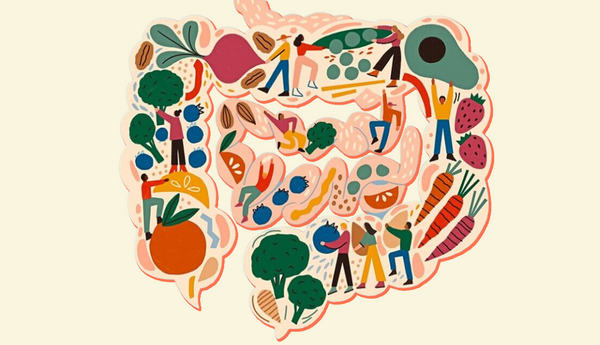No Products in the Cart
Unravel the fascinating links between your gut health and sleep quality, and discover how fermented foods like kvass can revolutionise your nights through groundbreaking new research.
Your gut houses both benevolent and malevolent types of bacteria. The adult intestinal tract is a bustling metropolis of approximately 1,000 types of microbiota (Li et al., 2018), which silently ward off viruses and harmful bacteria. At the same time, 70% of your immune system resides in your gut (National Institute of Allergy and Infectious Diseases, 2013), making sure the bacteria and germs in the gut don't cross their boundaries.
Groundbreaking new research from 2025 involving over 21,000 participants reveals that individuals with low dietary microbe intake and sleep disorders face significantly higher mortality risks (Huang et al., 2025). This massive study demonstrates the critical importance of consuming fermented foods rich in live microbes for those struggling with sleep issues.
What if I told you that your gut microbe intake and sleep patterns are in a complex tango that could determine your long-term health? The human gut, often referred to as the "second brain", has a direct connection to your grey matter, and here's the kicker - the amount of live microbes you consume plays a significant role in how well you sleep and your overall health outcomes (Li et al., 2018; Huang et al., 2025).

But why does this even matter? Here's the scoop: sleep is intimately linked to your immune system and longevity. The latest research shows that the combination of poor sleep and low dietary microbe intake creates a perfect storm for health problems (Huang et al., 2025). High-quality sleep nurtures a robust immune defence, ensuring your gut flora remains in tip-top shape.
Here's where it gets even more intriguing: during sleep, parts of your immune system kick into high gear (Ganz, 2012). When white blood cells detect an invader, they release cytokines, which act as messengers for the immune system, orchestrating its responses to diseases and pathogens.
However, there's a catch. This activity is influenced by sleep and your body's internal 24-hour clock, known as the circadian rhythm, which is in turn affected by your diet, meal timings, sleep patterns, and crucially - your intake of fermented foods and dietary microbes.

Research has shown that even mild sleep deprivation can negatively impact gut health (Benedict et al., 2016). This manifests as reduced insulin sensitivity, a decrease in beneficial gut bacteria, and changes in the microbiome linked to type II diabetes.
The 2025 NHANES study reveals alarming statistics: individuals with sleep disorders who consumed low amounts of dietary microbes had 74.9% higher all-cause mortality risk and 120% higher cardiovascular mortality risk compared to those with healthy sleep and high microbe intake (Huang et al., 2025).
Sleep deprivation can cause inflammation by releasing pro-inflammatory cytokines, which in turn can change the composition and abundance of intestinal microbes (Zhang et al., 2023).

You can bolster your sleep by encouraging the growth of good bacteria in your gut through consuming fermented foods rich in live microbes. The latest research specifically recommends incorporating a variety of fermented foods into your diet (Huang et al., 2025).
What's more, you don't have to wait until your first cup of coffee to feel invigorated - fermented beverages like kvass provide over 500 billion live cultures per serving, making them one of the most concentrated sources of beneficial microbes available.
So, how can you wield the power of your gut to seize the night? Here are actionable steps backed by the latest science:
Remove these products from your diet to help your gut:
Add these products to your diet to help your gut and sleep:
The 2025 research provides compelling evidence that dietary microbe intake through fermented foods may help counteract the negative health effects of sleep disorders. The study authors specifically note that "dietary microorganism supplementation may help reduce the negative effects associated with sleep disorders, thereby extending lifespan and improving long-term prognosis" (Huang et al., 2025).
Among fermented foods, traditionally fermented beverages like kvass offer unique advantages. With their combination of live cultures, postbiotic compounds from fermentation, and high fibre content (6.7 g per serving in Quas), they address multiple aspects of the gut-sleep connection simultaneously.
Sleep, gut health and immune system are inextricably intertwined. The groundbreaking 2025 study confirms that skimping on sleep while consuming few dietary microbes throws your gut microbiome off-kilter, significantly increasing mortality risk. This vicious cycle continues as your compromised gut makes it even harder to catch those precious Z's.
By valuing and nurturing your gut through consuming fermented foods rich in live microbes - particularly fermented beverages like kvass - along with sufficient sleep, you can break the cycle. The payoff? Improved sleep quality, enhanced longevity, and an enhanced zest for life!
Ready to transform your sleep through better gut health? Discover how Quas's award-winning fermented kvass, with over 500 billion live cultures per serving, can support your journey to better sleep and improved wellbeing. Shop our range of traditionally fermented kvass flavours and join thousands who've already discovered the gut-sleep connection.